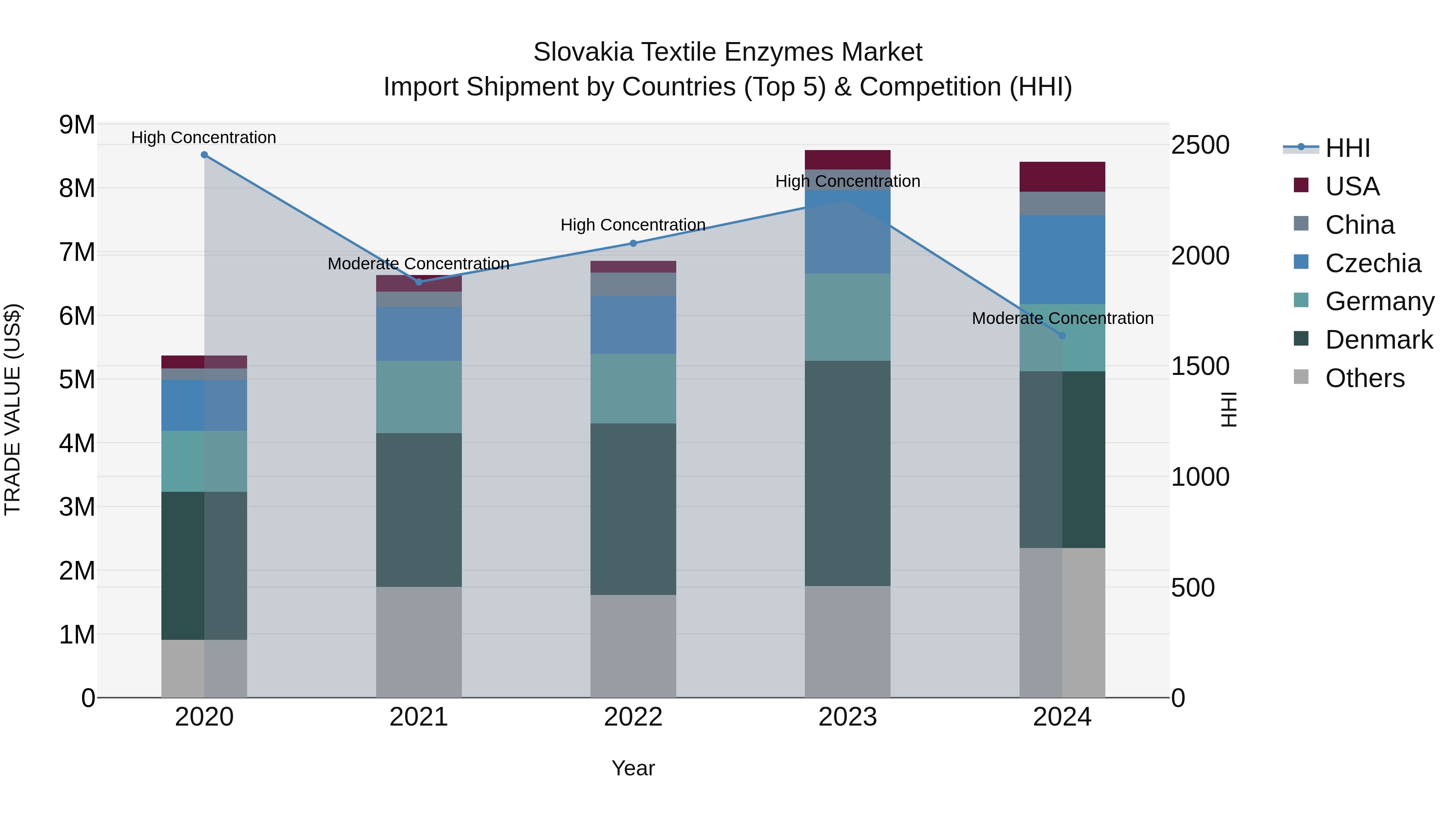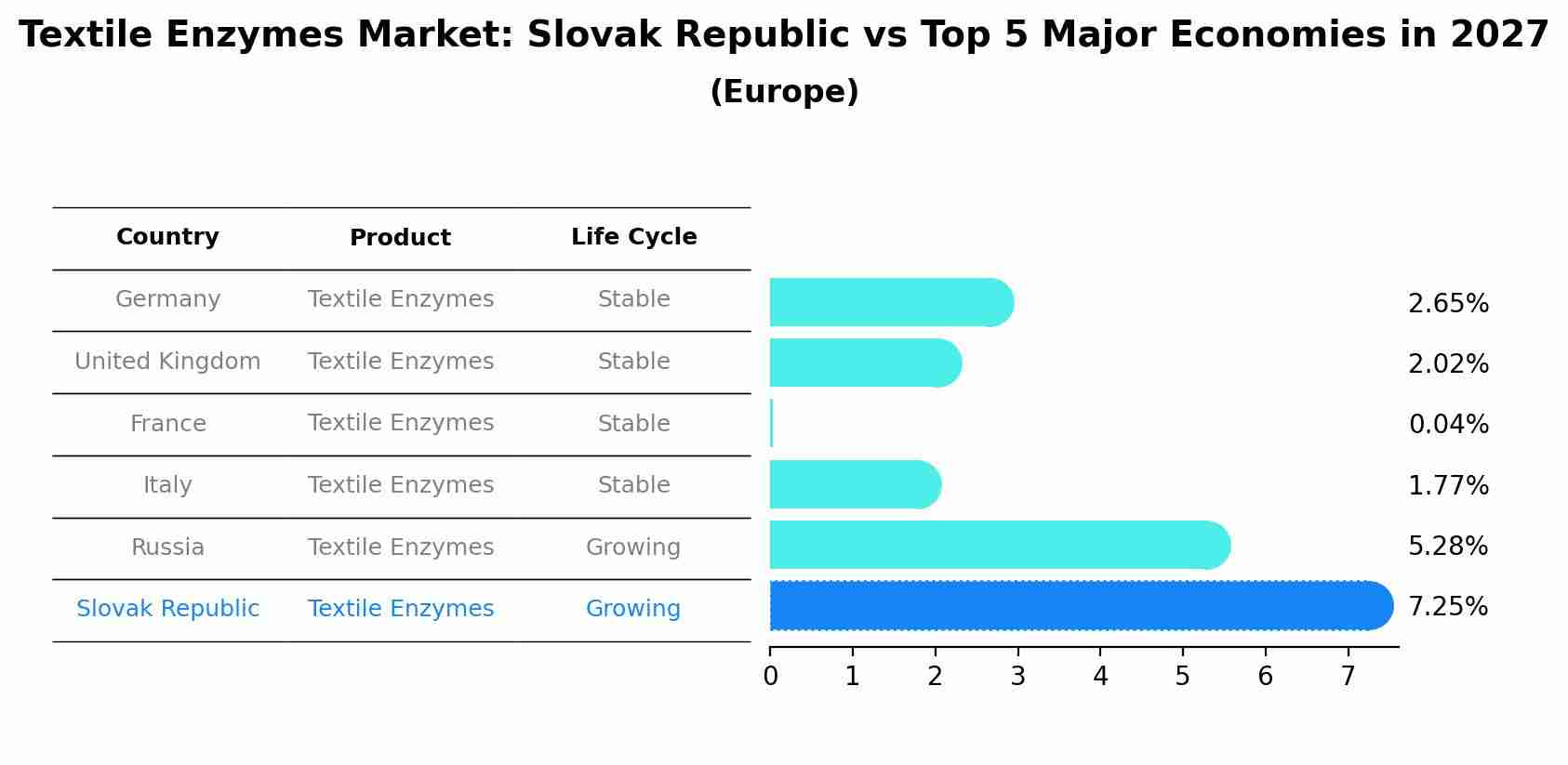Slovakia Textile Enzymes Market Outlook | Share, Companies, Forecast, Size, Revenue, Value, Analysis, Industry, Growth, COVID-19 IMPACT & Trends
| Product Code: ETC094059 | Publication Date: Jun 2021 | Updated Date: Nov 2025 | Product Type: Report | |
| Publisher: 6Wresearch | Author: Ravi Bhandari | No. of Pages: 70 | No. of Figures: 35 | No. of Tables: 5 |
Slovakia Textile Enzymes Market Top 5 Importing Countries and Market Competition (HHI) Analysis
Slovakia`s textile enzymes import Market Top 5 Importing Countries and Market Competition (HHI) Analysis saw a shift in concentration levels from high to moderate in 2024, indicating a more balanced distribution among top exporting countries. Denmark, Czechia, Germany, USA, and China emerged as key players in 2024, driving a healthy compound annual growth rate of 11.87% from 2020 to 2024. Despite a slight decline in growth rate in 2024, the Market Top 5 Importing Countries and Market Competition (HHI) Analysis remains dynamic and offers opportunities for both domestic and international players in the textile enzymes sector.

Textile Enzymes Market: Slovak Republic vs Top 5 Major Economies in 2027 (Europe)
In the Europe region, the Textile Enzymes market in Slovak Republic is projected to expand at a growing growth rate of 7.25% by 2027. The largest economy is Germany, followed by United Kingdom, France, Italy and Russia.

Slovakia Textile Enzymes Market Overview
The Slovakia Textile Enzymes Market is experiencing steady growth due to increasing demand for eco-friendly and sustainable textile processing solutions. Enzymes play a crucial role in various processes such as desizing, bio-polishing, and finishing in the textile industry, offering benefits like reduced water consumption, energy savings, and improved product quality. Key players in the market are focusing on developing innovative enzyme solutions tailored to the specific needs of Slovakian textile manufacturers. The market is also witnessing a shift towards bio-based and bio-degradable enzyme products in line with the country`s environmental regulations. Overall, the Slovakia Textile Enzymes Market is poised for further expansion as the industry continues to prioritize sustainable practices and efficient production processes.
Slovakia Textile Enzymes Market Trends
The Slovakia Textile Enzymes Market is experiencing a growing demand for eco-friendly solutions, driving the adoption of enzyme-based products in textile processing. Enzymes are being increasingly utilized in various stages of textile production, such as desizing, bio-polishing, and finishing, due to their ability to improve efficiency and reduce environmental impact. The market is also witnessing a shift towards sustainable practices, with textile manufacturers focusing on reducing water and energy consumption. Moreover, advancements in enzyme technology, such as the development of novel enzyme formulations and improved process efficiency, are further driving the market growth. Overall, the Slovakia Textile Enzymes Market is poised for expansion as the industry continues to prioritize sustainability and innovation in textile processing.
Slovakia Textile Enzymes Market Challenges
The Slovakia Textile Enzymes Market faces various challenges, including increasing competition from other textile treatment methods, fluctuating raw material prices, and stringent environmental regulations. As consumers become more environmentally conscious, there is a growing demand for sustainable and eco-friendly textile enzymes, putting pressure on companies to innovate and invest in research and development. Additionally, the market may also face challenges related to technological advancements and the need for continuous improvement in enzyme formulations to cater to changing consumer preferences and regulatory requirements. Overall, companies operating in the Slovakia Textile Enzymes Market need to navigate these challenges effectively to maintain a competitive edge and capitalize on the growing opportunities in the textile industry.
Slovakia Textile Enzymes Market Investment Opportunities
The Slovakia Textile Enzymes Market offers several investment opportunities for companies looking to capitalize on the growing demand for eco-friendly and sustainable textile processing solutions. Enzymes used in textile processing offer benefits such as reduced water and energy consumption, improved process efficiency, and higher product quality. Investing in research and development of innovative enzyme solutions tailored to the specific needs of the Slovakian textile industry can provide a competitive edge. Additionally, partnerships with local textile manufacturers to promote the adoption of enzyme-based processes can open up new revenue streams. With increasing consumer awareness and regulatory pressures driving the shift towards sustainable textile production practices, investing in the Slovakia Textile Enzymes Market presents a promising opportunity for companies seeking growth in the region.
Slovakia Textile Enzymes Market Government Policy
In Slovakia, the textile enzymes market is influenced by various government policies aimed at promoting sustainable practices in the textile industry. The government has implemented regulations to encourage the use of eco-friendly enzymes in textile processing to reduce environmental impact. Additionally, there are incentives and subsidies provided to companies that invest in research and development of innovative enzyme technologies for the textile sector. Furthermore, the government focuses on ensuring compliance with international standards and regulations related to textile enzymes to maintain quality and safety standards in the market. Overall, the government policies in Slovakia support the growth of the textile enzymes market by fostering sustainability, innovation, and adherence to industry standards.
Slovakia Textile Enzymes Market Future Outlook
The Slovakia Textile Enzymes Market is poised for steady growth in the foreseeable future. Factors such as increasing demand for sustainable and eco-friendly textile processing solutions, coupled with the growing awareness about the benefits of using enzymes in textile production, are driving market expansion. Enzymes offer advantages such as reduced water and energy consumption, improved fabric quality, and enhanced process efficiency, making them increasingly popular among textile manufacturers in Slovakia. Additionally, the rising trend of fast fashion and the emphasis on reducing chemical usage in textile production processes are expected to further boost the adoption of textile enzymes in the market. Overall, the Slovakia Textile Enzymes Market is likely to experience continuous growth as the industry continues to prioritize sustainability and innovation in textile processing.
Key Highlights of the Report:
- Slovakia Textile Enzymes Market Outlook
- Market Size of Slovakia Textile Enzymes Market, 2021
- Forecast of Slovakia Textile Enzymes Market, 2027
- Historical Data and Forecast of Slovakia Textile Enzymes Revenues & Volume for the Period 2018 - 2027
- Slovakia Textile Enzymes Market Trend Evolution
- Slovakia Textile Enzymes Market Drivers and Challenges
- Slovakia Textile Enzymes Price Trends
- Slovakia Textile Enzymes Porter's Five Forces
- Slovakia Textile Enzymes Industry Life Cycle
- Historical Data and Forecast of Slovakia Textile Enzymes Market Revenues & Volume By Type for the Period 2018 - 2027
- Historical Data and Forecast of Slovakia Textile Enzymes Market Revenues & Volume By Cellulase for the Period 2018 - 2027
- Historical Data and Forecast of Slovakia Textile Enzymes Market Revenues & Volume By Amylase for the Period 2018 - 2027
- Historical Data and Forecast of Slovakia Textile Enzymes Market Revenues & Volume By Catalase for the Period 2018 - 2027
- Historical Data and Forecast of Slovakia Textile Enzymes Market Revenues & Volume By Pectinase for the Period 2018 - 2027
- Historical Data and Forecast of Slovakia Textile Enzymes Market Revenues & Volume By Laccase for the Period 2018 - 2027
- Historical Data and Forecast of Slovakia Textile Enzymes Market Revenues & Volume By Others for the Period 2018 - 2027
- Historical Data and Forecast of Slovakia Textile Enzymes Market Revenues & Volume By Application for the Period 2018 - 2027
- Historical Data and Forecast of Slovakia Textile Enzymes Market Revenues & Volume By Bio-polishing for the Period 2018 - 2027
- Historical Data and Forecast of Slovakia Textile Enzymes Market Revenues & Volume By Desizing for the Period 2018 - 2027
- Historical Data and Forecast of Slovakia Textile Enzymes Market Revenues & Volume By Enzymatic Bleaching for the Period 2018 - 2027
- Historical Data and Forecast of Slovakia Textile Enzymes Market Revenues & Volume By Bioscouring for the Period 2018 - 2027
- Historical Data and Forecast of Slovakia Textile Enzymes Market Revenues & Volume By Others for the Period 2018 - 2027
- Slovakia Textile Enzymes Import Export Trade Statistics
- Market Opportunity Assessment By Type
- Market Opportunity Assessment By Application
- Slovakia Textile Enzymes Top Companies Market Share
- Slovakia Textile Enzymes Competitive Benchmarking By Technical and Operational Parameters
- Slovakia Textile Enzymes Company Profiles
- Slovakia Textile Enzymes Key Strategic Recommendations
Frequently Asked Questions About the Market Study (FAQs):
- Single User License$ 1,995
- Department License$ 2,400
- Site License$ 3,120
- Global License$ 3,795
Search
Thought Leadership and Analyst Meet
Our Clients
Related Reports
- Afghanistan Apparel Market (2026-2032) | Growth, Outlook, Industry, Segmentation, Forecast, Size, Companies, Trends, Value, Share, Analysis & Revenue
- Canada Oil and Gas Market (2026-2032) | Share, Segmentation, Value, Industry, Trends, Forecast, Analysis, Size & Revenue, Growth, Competitive Landscape, Outlook, Companies
- Germany Breakfast Food Market (2026-2032) | Industry, Share, Growth, Size, Companies, Value, Analysis, Revenue, Trends, Forecast & Outlook
- Australia Briquette Market (2025-2031) | Growth, Size, Revenue, Forecast, Analysis, Trends, Value, Share, Industry & Companies
- Vietnam System Integrator Market (2025-2031) | Size, Companies, Analysis, Industry, Value, Forecast, Growth, Trends, Revenue & Share
- ASEAN and Thailand Brain Health Supplements Market (2025-2031) | Strategy, Consumer Insights, Analysis, Investment Trends, Opportunities, Growth, Size, Share, Industry, Revenue, Segments, Value, Segmentation, Supply, Forecast, Restraints, Outlook, Competition, Drivers, Trends, Demand, Pricing Analysis, Competitive, Strategic Insights, Companies, Challenges
- ASEAN Bearings Market (2025-2031) | Strategy, Consumer Insights, Analysis, Investment Trends, Opportunities, Growth, Size, Share, Industry, Revenue, Segments, Value, Segmentation, Supply, Forecast, Restraints, Outlook, Competition, Drivers, Trends, Demand, Pricing Analysis, Competitive, Strategic Insights, Companies, Challenges
- Europe Flooring Market (2025-2031) | Outlook, Share, Industry, Trends, Forecast, Companies, Revenue, Size, Analysis, Growth & Value
- Saudi Arabia Manlift Market (2025-2031) | Outlook, Size, Growth, Trends, Companies, Industry, Revenue, Value, Share, Forecast & Analysis
- Uganda Excavator, Crane, and Wheel Loaders Market (2025-2031) | Strategy, Consumer Insights, Analysis, Investment Trends, Opportunities, Growth, Size, Share, Industry, Revenue, Segments, Value, Segmentation, Supply, Forecast, Restraints, Outlook, Competition, Drivers, Trends, Demand, Pricing Analysis, Competitive, Strategic Insights, Companies, Challenges
Industry Events and Analyst Meet
Whitepaper
- Middle East & Africa Commercial Security Market Click here to view more.
- Middle East & Africa Fire Safety Systems & Equipment Market Click here to view more.
- GCC Drone Market Click here to view more.
- Middle East Lighting Fixture Market Click here to view more.
- GCC Physical & Perimeter Security Market Click here to view more.
6WResearch In News
- Doha a strategic location for EV manufacturing hub: IPA Qatar
- Demand for luxury TVs surging in the GCC, says Samsung
- Empowering Growth: The Thriving Journey of Bangladesh’s Cable Industry
- Demand for luxury TVs surging in the GCC, says Samsung
- Video call with a traditional healer? Once unthinkable, it’s now common in South Africa
- Intelligent Buildings To Smooth GCC’s Path To Net Zero


















